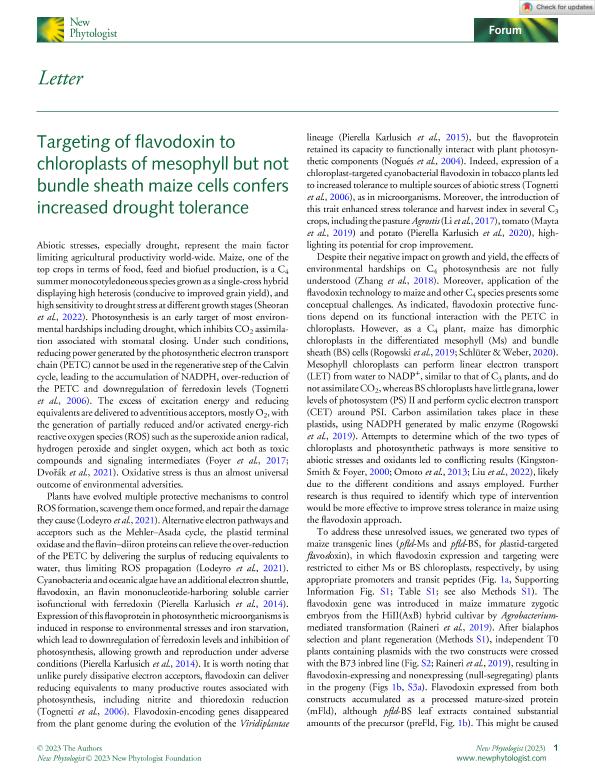Mostrar el registro sencillo del ítem
dc.contributor.author
Demarchi, Mariana

dc.contributor.author
Arce, Rocio Cecilia

dc.contributor.author
Campi, Mabel

dc.contributor.author
Pierella Karlusich, Juan José

dc.contributor.author
Hajirezaei, Mohammad Reza
dc.contributor.author
Melzer, Michael
dc.contributor.author
Lodeyro, Anabella Fernanda

dc.contributor.author
Chan, Raquel Lia

dc.contributor.author
Carrillo, Nestor Jose

dc.date.available
2024-02-05T13:08:23Z
dc.date.issued
2023-10
dc.identifier.citation
Demarchi, Mariana; Arce, Rocio Cecilia; Campi, Mabel; Pierella Karlusich, Juan José; Hajirezaei, Mohammad Reza; et al.; Targeting of flavodoxin to chloroplasts of mesophyll but not bundle sheath maize cells confers increased drought tolerance; Wiley Blackwell Publishing, Inc; New Phytologist; 240; 6; 10-2023; 2179-2184
dc.identifier.issn
0028-646X
dc.identifier.uri
http://hdl.handle.net/11336/225742
dc.description.abstract
Photosynthetic metabolism in C4 plants is split between two types of dimorphic cells and chloroplasts, with mesophyll chloroplasts performing linear electron transport from water to NADP+, similar to that of C3 plants, and bundle sheath plastids, which have little grana and photosystem II, performing cyclic electron transport and CO2 assimilation. While the negative effects of environmental stresses on C3 photosynthesis are extensively documented, information regarding the stress effects on C4 photosynthetic pathways is scarce and somehow contradictory. We propose in this article a strategy to improve stress tolerance in the main C4 crop, maize, with a minimum of genetic intervention. It is based on the tissue-specific expression of a cyanobacterial flavodoxin, an alternative electron shuttle which prevents over-reduction of the photosynthetic electron transport chain (PETC) under stress, and has been shown to increase stress tolerance in C3 crop and model species. By interacting with the PETC, flavodoxin could be used as a tool to identify which type of C4 photosynthetic pathway is more sensitive to environmental and oxidative challenges.Main questions addressed are therefore: i) which type of genetic modification(s) can provide increased drought and oxidative stress tolerance, and ii) which type of photosynthetic pathway, cell, chloroplast, etc., is more sensitive to environmental hardships in C4 plants.The article reports that flavodoxin does improve stress tolerance in maize, but only when expressed in mesophyll plastids, suggesting that lineal electron transport is the most stress-sensitive pathway, and the one that profits more from flavodoxin interaction. The results reported here open novel avenues of crop improvement in the face of harsher conditions and global climate change affecting sub-irrigated cultivation lands. In addition to its biotech relevance, the results illustrate the use of flavodoxin as a tool to further investigate the response and sensitivity of the different C4 photosynthetic pathways to environmental inputs, a largely unexplored field.
dc.format
application/pdf
dc.language.iso
eng
dc.publisher
Wiley Blackwell Publishing, Inc

dc.rights
info:eu-repo/semantics/openAccess
dc.rights.uri
https://creativecommons.org/licenses/by-nc-sa/2.5/ar/
dc.subject
BUNDLE SHEATH CELLS
dc.subject
C4 PLANT
dc.subject
CHLOROPLAST
dc.subject
DROUGHT
dc.subject
FLAVODOXIN
dc.subject
MAIZE
dc.subject
MESOPHYLL CELLS
dc.subject
PHOTOSYNTHESIS
dc.subject.classification
Tecnología GM, clonación de ganado, selección asistida, diagnósticos, tecnología de producción de biomasa, etc.

dc.subject.classification
Biotecnología Agropecuaria

dc.subject.classification
CIENCIAS AGRÍCOLAS

dc.title
Targeting of flavodoxin to chloroplasts of mesophyll but not bundle sheath maize cells confers increased drought tolerance
dc.type
info:eu-repo/semantics/article
dc.type
info:ar-repo/semantics/artículo
dc.type
info:eu-repo/semantics/publishedVersion
dc.date.updated
2024-02-02T15:50:55Z
dc.journal.volume
240
dc.journal.number
6
dc.journal.pagination
2179-2184
dc.journal.pais
Reino Unido

dc.journal.ciudad
Londres
dc.description.fil
Fil: Demarchi, Mariana. Consejo Nacional de Investigaciones Científicas y Técnicas. Centro Científico Tecnológico Conicet - Rosario. Instituto de Biología Molecular y Celular de Rosario. Universidad Nacional de Rosario. Facultad de Ciencias Bioquímicas y Farmacéuticas. Instituto de Biología Molecular y Celular de Rosario; Argentina
dc.description.fil
Fil: Arce, Rocio Cecilia. Consejo Nacional de Investigaciones Científicas y Técnicas. Centro Científico Tecnológico Conicet - Rosario. Instituto de Biología Molecular y Celular de Rosario. Universidad Nacional de Rosario. Facultad de Ciencias Bioquímicas y Farmacéuticas. Instituto de Biología Molecular y Celular de Rosario; Argentina
dc.description.fil
Fil: Campi, Mabel. Consejo Nacional de Investigaciones Científicas y Técnicas. Centro Científico Tecnológico Conicet - Santa Fe. Instituto de Agrobiotecnología del Litoral. Universidad Nacional del Litoral. Instituto de Agrobiotecnología del Litoral; Argentina
dc.description.fil
Fil: Pierella Karlusich, Juan José. Consejo Nacional de Investigaciones Científicas y Técnicas. Centro Científico Tecnológico Conicet - Rosario. Instituto de Biología Molecular y Celular de Rosario. Universidad Nacional de Rosario. Facultad de Ciencias Bioquímicas y Farmacéuticas. Instituto de Biología Molecular y Celular de Rosario; Argentina
dc.description.fil
Fil: Hajirezaei, Mohammad Reza. Leibniz Institute Of Plant Genetics And Crop Plant Research.; Alemania
dc.description.fil
Fil: Melzer, Michael. Leibniz Institute Of Plant Genetics And Crop Plant Research.; Alemania
dc.description.fil
Fil: Lodeyro, Anabella Fernanda. Consejo Nacional de Investigaciones Científicas y Técnicas. Centro Científico Tecnológico Conicet - Rosario. Instituto de Biología Molecular y Celular de Rosario. Universidad Nacional de Rosario. Facultad de Ciencias Bioquímicas y Farmacéuticas. Instituto de Biología Molecular y Celular de Rosario; Argentina
dc.description.fil
Fil: Chan, Raquel Lia. Consejo Nacional de Investigaciones Científicas y Técnicas. Centro Científico Tecnológico Conicet - Santa Fe. Instituto de Agrobiotecnología del Litoral. Universidad Nacional del Litoral. Instituto de Agrobiotecnología del Litoral; Argentina
dc.description.fil
Fil: Carrillo, Nestor Jose. Consejo Nacional de Investigaciones Científicas y Técnicas. Centro Científico Tecnológico Conicet - Rosario. Instituto de Biología Molecular y Celular de Rosario. Universidad Nacional de Rosario. Facultad de Ciencias Bioquímicas y Farmacéuticas. Instituto de Biología Molecular y Celular de Rosario; Argentina
dc.journal.title
New Phytologist

dc.relation.alternativeid
info:eu-repo/semantics/altIdentifier/url/https://nph.onlinelibrary.wiley.com/doi/10.1111/nph.19281
dc.relation.alternativeid
info:eu-repo/semantics/altIdentifier/doi/http://dx.doi.org/10.1111/nph.19281
Archivos asociados
